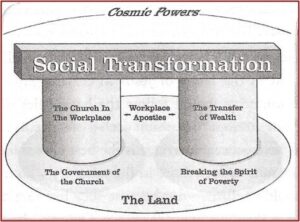
In the Preface to his book, Dominion! Your Role in Bringing Heaven to Earth, C. Peter Wagner said he wrote it to provide a biblical, theological, and strategic foundation for the church to actively engage in “the urgent mandate of God” to engage in transforming society. He acknowledged this was a relatively new concept for both the nuclear church and what he referred to as “the extended church of the workplace.” He said he had been working on what he called “the dominion mandate” since the mid-1990s. He also said this required a radical paradigm shift for him because he had not previously thought that becoming involved with society was a “God-given assignment for the church.” In order to give his readers the big picture, he described a series of what he thought were important concepts—and led them into the theological Twilight Zone of the NAR, the New Apostolic Reformation.
In order to get the big picture, I will try to pull together many important conceptual threads such as the biblical government of the church (i.e., apostles and prophets), dominion or kingdom theology, an open view of God, the church in the workplace, the great transfer of wealth, and other related themes.
My basic premise is that God’s kingdom should come and that His will should be done here on earth as it is in heaven [note the subtitle of Dominion!]. This is clearly a Christian principle because these are the very words Jesus taught his disciples to pray every day in the Lord’s Prayer.
Obviously, right now we all find ourselves on earth—not yet in heaven. Consequently, we must follow certain earthly rules if we are going to change our society for the good. A starting point is to recognize what many of us have been calling the “Seven Mountain Mandate,” which are the supreme molders of culture: Religion, Family, Education, Media, Government, Arts & Entertainment, and Business. For a given society to change, each one of the Seven Mountains needs to be influenced or “dominated” by persons of goodwill, whether Christians or non-Christians. This is a positive way of looking at dominionism.
His hope was that those who agree with his vision would achieve positions of influence over society; within cities, states, nations or territories and people groups. He thought the biblical theology underlying this vision was called “dominion theology.” In Wagner’s own words, this is what his vision would look like:
Every segment of the society in which we live would be permeated with the peace and justice and prosperity and health and righteousness and joy and harmony and love and freedom that characterize God’s original design for human life. All earthly societies, including our own U.S., would be happier and more fulfilled with these qualities of life fully realized than without them.
Wagner denied that his utopian vision of dominion theology would lead to a theocracy, “meaning a government headed up by God.” He pointed out that Bible-believing people look towards the time when the whole earth will be ruled by God. As the Creator of the universe, “He has the ultimate right to rule.” Referring to the book of Revelation, he said Jesus Christ is predicted to return to earth once again “as a warrior on a white horse.” At that time, he will take charge of human society once and for all. “And when that happens, we will experience a new earth different from anything we have known since Adam and Eve.”
“However, all this is in the future. No one knows when this will happen. It may be in our generation, it may be many generations from now.” Meanwhile, Christians are responsible to do the best we can (with all of our shortcoming and imperfections) to establish human societies that (as far as possible) reflect “the blessings of God on all humanity.” In his opinion, the best way to accomplish this was with democracy, not theocracy or “ecclesiocracy,” where the church would rule. Returning to what he called the “Seven Mountain Template,” Wagner said the church should recognize its activities and influence operates within the Religion Mountain, “not in any of the other six.” Civil government was a function of the Government Mountain, “and the two should not be confused.”
None of this detracts from the central thesis of this book that God’s plan is for His kingdom to come to earth as it is in heaven right in the here and now. This means that kingdom-minded and kingdom-motivated individuals in all seven of the mountains must strive toward influencing and taking dominion of whatever sphere of society God has assigned them. When this is applied to the Government Mountain, it means that God’s people with high biblical standards should seek to occupy the highest possible government offices within whatever form of government they find themselves. This is biblical dominionism, but not theocracy.
So, by this point in the Preface for Dominion! Wagner told us he believes God has introduced a new form of church government in nuclear, local churches. And it was the most radical change in doing church since the Protestant Reformation. This was the initiation of the so-called Second Apostolic Age, which he thought began around 2001. The blanket term for churches involved in this new paradigm, according to Wagner, was the New Apostolic Reformation. The gift and office of prophet began to be affirmed in the church in the 1980s; and the gift and office of apostle began to be recognized in the 1990s. Here Wagner is simply repeating a statement made by Bill Hamon in Prophets and Personal Prophecy:
But now Christ is activating his prophets in the 1980s and his apostles in the 1990s. Jesus is thrilled at the thought that his prophets will soon be fully recognized and accepted by his church. When this happens it will escalate the approach of the consummation of the ages. It will accelerate the making ready of people for the Lord so he can return. It is the prophesying of the prophets that brings the church from a disorganized valley of dry bones to a unified coming together with growth and maturity until the church arises as an exceedingly great and mighty army of the Lord. (p. 28)
This NAR kind of “prophecy” is different than that of Pentecostals and charismatics. When someone holding the office of prophet in the NAR gives a prophecy, their words seem to its hearers to have almost divine authority. This leads NAR theology to affirm open theism, believing that “God is open to the changing realities of history,” which Peter Wagner argued was still “an open question.” From his perspective, “It is simply a different conclusion arrived at by those who take the authority of scripture [sic] and the sovereignty of God just as seriously as one another” (Dominion!, p. 83).
Theological Foundation of Open Theism
But open theism is new, extrabiblical revelation, not merely “another way of thinking about God” besides classic theism. It seems to be the theological foundation for how he envisions the social transformation of the world before the return of Christ. The Second Apostolic Age leads to the reformation of church government away from denominations and towards apostles and prophets. Then other “workplace” apostles will wage spiritual warfare as they attempt to extend their influence or dominion over the seven mountains of society, of culture.
Open theism provides another way of thinking about God. Like classical theism, it starts out with a clear biblical understanding that God is sovereign. That means that, among other things, He is all-powerful and that He can do whatever He wants. Both sides [classic and open theism] agree on this. God’s sovereignty is non-negotiable. But open theism suggests that, while God decided ahead of time that certain things would happen no matter what, He also decided to leave some other things open and depending on the choices that human beings would make. Not only that, but consider this: Isn’t God sovereign enough to limit His own sovereignty if He wants to?
Wagner thinks God limited His sovereignty to maintain His integrity. Assuming God leaves certain things open for human decisions to influence, “it would not seem right if He knew ahead of time what our decisions would be.”
Scott Oliphint, a professor of apologetics at Westminster Theological Seminary in Philadelphia, wrote “Most Moved Mediator” in the journal, Themelios (Vol. 30., no. 1, Autumn 2004). He said open theism undermined or subverted the very Christianity it wanted to maintain. First, it reduces or minimizes God’s “God-ness,” including his absolute sovereignty over his creation, it appeals directly to our sinful hearts. He said: “The god of open theism is not to be praised, but pitied; he is a pathetic excuse for a god, one that would fit well within the ancient Greek pantheon.”
Open theism seems to me to be heterodoxy. Wagner’s and the NAR’s use of it comes dangerously close to heresy. It supports the NAR belief in “forthtelling,” meaning the making prophetic declarations that cause the future: “speaking the word aloud actually sets their fulfillment in motion.” According to Bill Johnson of Bethel Church in Redding California, this supposedly happens because angels hear the spoken declarations and carry them out. He teaches that since God made man in his image, and “spoke worlds into being,” human beings have a similar ability, through their speech to change problematic situations. Being made in God’s image means a human person can do what God does, without qualification. See “Most Moved Mediator” and Reckless Christianity by Holly Pivec and Doug Geivett for a further critique of Bethel Church, open theism and prayer declarations.
The Social Transformation of Society
Wagner affirmed the need for social transformation, through the implementation of dominion or kingdom theology; which requires the paradigm shift in church leadership to apostles and prophets. This is then followed by the Seven Mountain Mandate, where individuals are called to seek positions of influence within the seven “mountains” of culture: Religion, Family, Education, Media, Government, Arts & Entertainment, and Business.
The individuals called to this work will be “workplace apostles,” within the extended church on the nonreligious mountains. Wagner said, “God has given them the spiritual gift of apostle, and He has called them to a ministry or activity in the workplace, as over against ministry in the nuclear church.” The true church has two different modes, both gathered and scattered—gathered in the local, nuclear church and scattered as the people of God within the six other mountains. This concept of workplace apostles is crucial for his utopian vision of bringing heaven to earth.
Wagner went on to say dominionism comes about by playing the rules of the democratic game, and through the votes of the people, fairly and squarely gaining the necessary influence in the Seven Mountains to benefit the whole nation, “and open all of society for the blessings, prosperity, and happiness God desires for all people.” He believed God revealed to him a graphic representation of the essential components for transforming society. “Back in 2005, I believe it was God Himself who revealed to me a graphic depicting the essential components for transforming society.” See below:
Social transformation, according to Wagner (not God), is supported by two pillars: the Church in the Workplace and the Transfer of Wealth. Between these pillars are what he calls “workplace apostles,” whose role he believes are essential and whom he believes come from the church in the workplace. In chapter seven of Dominion! he will say, “I do not believe that we will see the social transformation we desire unless our workplace apostles are properly activated.” Based upon his understanding of First Corinthians on spiritual gifts, apostles in the workplace will have different ministries and activities than apostles ministering in religious environments.
The second pillar, the “great” Transfer of Wealth, Wagner said has been promised by prophets for several years. Not surprisingly, Wagner wrote a book titled, The Great Transfer of Wealth, where he said the prophecy showed how God would fulfill the Great Commission and establish His kingdom on earth … in this generation. In Dominion! He said without vast amounts of wealth in the hands of kingdom-minded people, who are lined up with the principles of the kingdom of God, he is convinced we will not see the social transformation in his vision.
The first pillar, the Church in the Workplace, rests on the foundation of what Wagner said was the biblical Government of the Church, a transition that indicated to him that we are now in the Second Apostolic Age. Growing numbers of people are taking Ephesians 2:20 to mean that the gifts and offices of apostles and prophets are being restored to the modern church. Another book he wrote, Apostles Today, was said to be the textbook on the subject. This book calls for apostles to assume their rightful sphere of authority, to see God’s will accomplished on earth. Remember Wagner said the blanket term for churches now in the Second Apostolic Age is the New Apostolic Reformation.
The second pillar, the Transfer of Wealth, rests on the foundation of Breaking the Spirit of Poverty. Wagner lamented that large segments of the church imagine there is a correlation between piety and poverty, which he said was a crippling delusion. “We must cast out the spirit of poverty and replace it with the godly spirit of prosperity if we expect to act as effective agents of social transformation.” He will say in chapter 9 he is convinced that a significant reason why no American city has yet to be taken for God is because “we have not had enough money at our disposal.” Then there is “The Land.”
The Land underlying the whole structure and “The Cosmic Powers” hovering over it highlights the necessity of taking spiritual warfare seriously. As the leader of the forces of darkness, Satan hates the idea of righteous social transformation. He has come to steal, to kill, and to destroy (see John 10:10). He does not want people being happy and prosperous. Poverty and misery are the devil’s strong suits.
Many of the practices and beliefs shrouded in the NAR are openly described in C. Peter Wagner’s book, Dominion! The deconstruction or reformation of church government, the importance of the Seven Mountain Mandate, and the emergence of spiritual warfare conducted by NAR believers are three topics touched on here, but deserving a more complete analysis in future articles. Until then, remember that if you investigate the Twilight Zone of the NAR further, it is only “a world of fantasy or illusion” and not a so-called new revelation from God.






